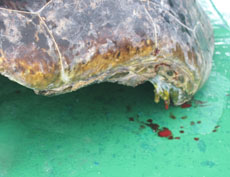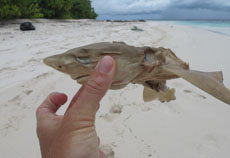A marine biologist working in the Baa Atoll UNESCO Biosphere Reserve has reported the discovery of the remains of a baby shark and endangered sea turtle barbecue on the uninhabited island of Funadhoo, one of the country’s 14 priority nesting beaches legally protected under Maldivian law.
Marine biologist with local environmental consultancy Seamarc, Sylvia Jagerroos, was participating in a beach clean up on August 24 with local people when the group came across the scene.
“We had removed fishing lines, nets, and other marine debris and of course all the garbage from the beach. This consisted mainly of plastic bottles, and that day we found many red bull cans,” she said.
The group then discovered the slaughtered remains of a large, one metre adult nesting green turtle and 2-3 newborn lemon sharks, “still smoking on the barbecue”, surrounded by smashed eggshells.
“We found where the killing took place, there was a lot of blood in the sand, and maybe what was the trace of the turtle crawling to try and nest. I don´t know if she was killed before or after the nesting. I didn’t find any nest, so if there was one then probably all the eggs were eaten already,” Jagerroos said.
“I went snorkeling and found the remains of the turtle in the nearby waters, including the head. Some bones and flippers, were discarded a couple of meters from the barbecue. I also found the remains of baby lemon sharks on the barbecue. The lemon sharks was a newborn sized only around 50-60 cm, the meat had been removed and eaten. My theory is that they saw the green turtle nesting and killed her immediately, while slaughtering and throwing in the pieces in the ocean. The baby sharks were attracted to the smell and since they swim in very shallow waters it’s a piece of cake to catch them.”
Jagerroos noted that the Maldives had proclaimed itself the world’s second shark sanctuary in March 2009.
“For a marine biologist to find a juvenile sickle fin lemon shark on the grill when this creature is listed as “Vulnerable on the red list” with the World Conservation Union (IUCN), and is already extinct in many nearby countries, hurts,” she said.
The catching and consumption of turtles is banned across the Maldives, and turtles – together with many other species – are especially protected in the biosphere reserve.
However turtle eggs are considered a local delicacy and can fetch up to MVR 10 each – a single nest can contain between 100-200. The practice is generally not illegal, but is prohibited on the country’s nesting islands.
 Marine biologists working on resorts in the atoll have also privately complained of boatloads of local poachers sneaking onto the islands at night without lights or noisy engines, after hearing of the discovery of a nest of eggs. In some instances, resorts have been forced to post security guards to protect the nests from poachers.
Marine biologists working on resorts in the atoll have also privately complained of boatloads of local poachers sneaking onto the islands at night without lights or noisy engines, after hearing of the discovery of a nest of eggs. In some instances, resorts have been forced to post security guards to protect the nests from poachers.
Baa Atoll was in June 2011 added to the UN body’s global list of biosphere reserves after five years of lobbying by the government, placing it in the company of world famous sites such as the Komodo in Indonesia, Uluru (Ayer’s Rock) in Australia and the Galapagos Islands.
The Baa Atoll Biosphere Reserve was officially launched alongside with Baa Atoll Conservation Fund by President Mohamed Waheed in July 2012 at a ceremony in the atoll’s capital of Eydhafushi. At the ceremony, the UNDP presented a cheque for US$250,000 as a contribution to the fund, on behalf of the Global Environment Facility (GEF).
Jagerroos said the team had called the Environmental Protection Authority’s (EPA) ranger at Hanifaaru Bay – a world famous habitat for mantas and whale sharks – “and he said they’d look into it. But they’d have to patrol the whole area – it’s too big,” she acknowledged.
 Director General of the Environmental Protection Authority (EPA) Ibrahim Naeem said he was not aware of the incident or that it had been reported to the Hanifaaru Bay ranger, and referred Minivan News to the Ministry of Fisheries which he said was responsible for sharks and turtles.
Director General of the Environmental Protection Authority (EPA) Ibrahim Naeem said he was not aware of the incident or that it had been reported to the Hanifaaru Bay ranger, and referred Minivan News to the Ministry of Fisheries which he said was responsible for sharks and turtles.
“It is not allowed to catch and eat turtles. There is no such ban for eggs. Even in the biosphere there are actions that are allowed,” Naeem said.
Minivan News is seeking comment from the Ministry of Fisheries.
Likes (1)Dislikes
(1)Dislikes (0)
(0) 
